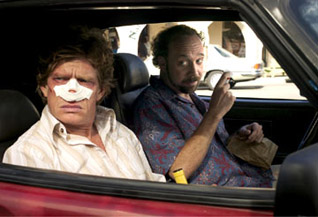|
|
Director's Spotlight:
|

|
Financially, Election probably ended up as a minor winner, but it really depends on what numbers you use. Reports have the production budget anywhere from $8.5 million to $25 million, and with just under a $15 million gross (with negligible earnings from overseas), which report you choose to believe makes a big difference here. Well reviewed and earning one Oscar nomination for best-adapted screenplay, Paramount was probably hoping that their platform release might've earned a tad more. As noted above, though, this comedy isn't so easy to watch, and even though it is funny, it's not exactly fun. Since its release, it has become regarded as something shy of a modern classic – at least in academic circles. Let's call it a wash financially, and a win critically for Payne, and move on to his next feature, set in, you guessed it, Omaha, Nebraska. New at BOP: Share & Save
![]() Tweet
Tweet
![]() Print this column
Print this column
About Schmidt
I am a firm believer that a film can be depressing and good at the same time. Scale doesn't have to be big – I am not someone who goes around preaching that the Academy is out of touch with consumers and even while I would have voted differently, I have no problem with someone choosing to honor The Hurt Locker over Avatar. That said, I do have a problem with About Schmidt and the loads of critical praise heaped upon it. Honestly, reading all those reviews on Rotten Tomatoes makes me feel like I'm taking crazy pills! Maybe I would "get" it better if I were a depressed, over-the-hill, 65-year-old retiree living in Omaha. But even if I "got" it then, I probably wouldn't enjoy seeing my sad life recreated by Jack Nicholson on the big screen.
About Schmidt tells the not-so-uplifting tale of Warren Schmidt. Warren's life hasn't amounted to much; he is recently retired from a career in insurance, he dislikes his wife (until she dies, suddenly, that is), his daughter thinks little of him and he thinks little of her dead-beat fiancé, and his only outlet for emotional venting comes in the form of long-winded, inappropriately intimate letters he sends to a six-year-old Tanzanian orphan, whom he decided to sponsor as a way of reaching some sort of post-retirement fulfillment.
|
Advertisement |
The truth is, I do in fact "get" what Payne is saying. Warren Schmidt is a man at a crossroads. His problems, like an unfortunate mass of Americans, are largely and maybe even solely existential in nature. His work life was wasted on a job that anyone could have done. His love life was wasted on a woman with whom he had no intimacy. And now he has no way to waste away his free time. He hasn't much culture, much purpose, or much hope. To cope, Schmidt then projects these sour, sad, and uniquely middle-class problems on a young child who has little concept of what it means to be educated or well fed, probably surviving off of Schmidt's measly donations. If this sounds like an evening at the movies that you would enjoy, then please, by all means, move About Schmidt up to the top of your Netflix queue.
About Schmidt also marks Payne's second straight film to take an actor who has long been known for being an arbiter of the cool and the chic – even into his later years – and turn him into a total and complete shlub. Never before and not since has Jack Nicholson seemed so utterly hopeless (not even in the Bucket List, which one might assume would be more of a downer than this film).
For their work, Jack Nicholson and a kooky (and, in one scene, nude) Kathy Bates received Oscar nominations in Best Actor and Supporting Actress categories respectively. The movie rode its critical buzz (and the buzz about Bates baring all) to a very impressive $65 million domestically, without ever earning more than $9 million in a single weekend. With a modest production budget of $30 million, this is the template that all prestige platform releases try to follow. Even with its distinctly American flavor, About Schmidt was able to pull in another $40 million from overseas, making Payne's second major feature, a major success.

|
|
|

|
Friday, November 1, 2024
© 2024 Box Office Prophets, a division of One Of Us, Inc.

